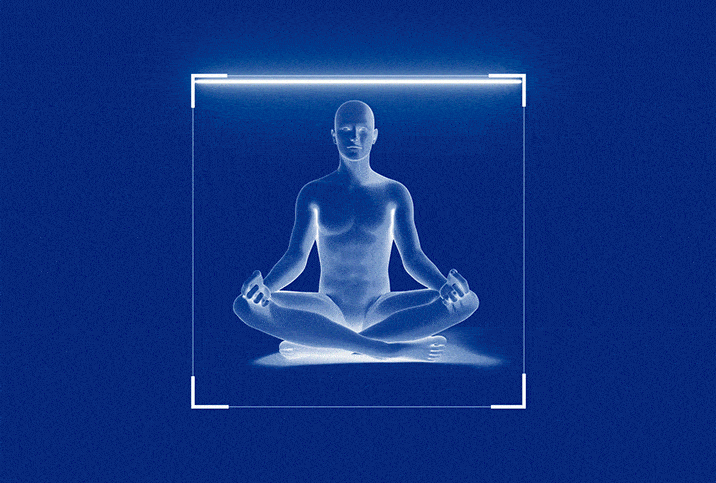Health Benefits of Meditation for Men Include Their Sex Lives

Meditation is a technique used to help clear the mind by training your brain to be present in the moment. While it may sound like an easy exercise, many people struggle with a practice that can include stillness and silence.
The training, just like yoga, is more popular among women. In 2017, only 11.8 percent of men and 16.3 percent of women practiced meditation, according to the National Center for Health Statistics (NCHS). The center's report recorded the percentage of adults in the United States between 2012 and 2017 who used meditation, yoga or a chiropractor in the previous 12 months.
While the use of both meditation and yoga increased significantly from the beginning of the time frame to the conclusion—up from 4.1 percent to 14.2 percent and from 9.5 percent to 14.3 percent, respectively—the numbers are still very low considering the purported benefits these exercises offer.
"Physically, meditation calms the nervous system and reduces cortisol by kick-starting the parasympathetic nervous system, our body's rest and digest responses," said Ciara McGinley, a certified meditation teacher and the founder of Finding Quiet, a meditation practice based in London.
"It also encourages us to live more mindfully, to get out of our head and into the present moment, tuning in to any sensations we're experiencing and dialing down the chatter of the mind," she continued. "This could really help to improve your sex life, too, encouraging you to focus on sensations you're experiencing over thoughts running through your head."
Here are a few of the ways mindfulness and meditation can benefit your overall health and your sex life.
Meditation reduces stress and anxiety and promotes better sleep
On both emotional and physical levels, the upsides of mediation include calming and focusing the mind, improving sleep quality, and helping increase self-awareness, explained Steven Allder, M.D., a consultant neurologist at Re:Cognition Health, a cognitive healthcare clinic headquartered in London.
"Studies have also shown that after eight weeks of short, daily meditation, it can also help to decrease negative mood, reduce anxiety and enhance attention, working memory and recognition memory," Allder said.
Stress reduction through meditation can be beneficial for sex, he added. Increases in stress-induced cortisol and adrenaline lower sexual desire and performance, which is also linked to erectile dysfunction (ED).
"The deep rest achieved through meditation is highly beneficial for sexual health," Allder said. "Individuals practicing sexual mindfulness have been shown to have better self-esteem and to be more satisfied with their relationships."
Meditation helps fight addictions
Meditation has been incorporated into addiction recovery therapies as a technique to help battle substance use cravings, triggers and withdrawal symptoms. It has resulted in a reduced risk of relapse, according to the Addiction Center, an informational web guide.
A 2018 review of the current state of mindfulness-based interventions (MBIs) for addictions found that since mindfulness enhances conscious control over automatic habits and motivational drives, it can be efficient for substance use disorders. The reason is that addictions are caused mainly by mental and behavioral automaticity as a result of hedonic or reward-based regulation in the brain.
"MBIs may ultimately provide a skillful means of liberating the individual from the push and pull of hedonic dysregulation underlying addiction," the researchers concluded.
Meditation reduces loneliness and increases social contact
The isolation caused by COVID-19 has been difficult for a lot of people. They have had to deal with the fear and uncertainty around the pandemic and other recent events.
A 2019 study assigned 153 adults a two-week, smartphone-based mindfulness training exercise centered around the assumption that openness and acceptance of the present moment can promote social connections. The participants were randomly allocated into three groups:
- Monitor-and-accept training (monitoring present-moment experiences with an orientation of acceptance)
- Monitor only
- A control group
The monitor-and-accept group reported a 22 percent reduction in daily-life loneliness. Group members also increased their social contacts by two more daily interactions and one more person each day compared with the other groups.
"By fostering equanimity with feelings of loneliness and social disconnect, acceptance skills training may allow loneliness to dissipate and encourage greater engagement with others in daily life," the study authors noted.
Meditation promotes altruism, resulting in an improved sex life
UCLA Health and Yale University researchers conducted a study published in 2020 in the journal Scientific Reports on the effects of mindfulness meditation on altering pro-social behavior. They found participants who watched a short meditation video donated 2.61 times more money to charity than the control group.
The 326 participants were randomly put into two groups. One group watched a meditation video, while the other watched a drawing instructional video for kids. Then they were requested to donate part of the money they received for participation to a charitable cause.
The experiment had a significant effect on the contributions of people ages 25 or younger—since their peers in the control group did not really donate—as well as on people below college-level education.
You might be wondering what altruism has to do with your sex life. Another analysis showed that women prefer altruism over physical attractiveness in long-term relationships. Furthermore, men who perform more good deeds have more sex, whether they are in a relationship or not, according to research.
In theory, any techniques that reduce your stress levels could improve your sex life, McGinley concluded, if underlying stress or letting your mind wander is a big obstacle for you in the bedroom.
"Of course, just because you meditate doesn't mean you're going to instantly have an amazing sex life," McGinley said. "But over time, with a regular meditation practice, you'll start to see the benefits."
Overcoming sexual dysfunction, including erectile dysfunction, often requires a combination of treatments. A wearable medical device is one way to address in-the-moment erectile issues. Eddie® is an FDA-registered Class II medical device worn at the base of the penis in front of the scrotum and designed to treat erectile dysfunction and improve male sexual performance. In 2021 clinical trials, Eddie proved effective in treating men with physically, psychologically and pharmacologically induced ED. Of the study participants, 95 percent of men who used Eddie reported a beneficial effect on their sex lives.


















